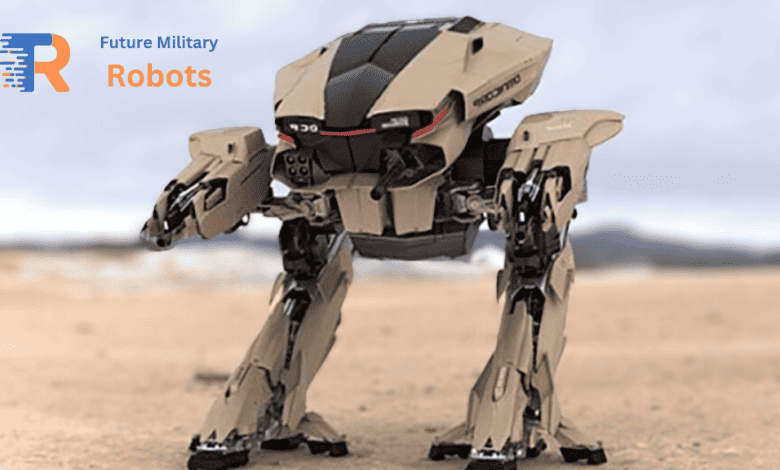
Will robots be used in the military? Wars of the future? Indeed, robots are as of now being utilized in different limits by militaries all over the planet, and their utilization is supposed to proceed and possibly grow from here on out. Automated Aeronautical Vehicles (UAVs) or Robots: Military powers use drones for observation, surveillance, target ID, and even airstrikes.
Robots can work in regions that may be excessively hazardous for human pilots and can give ongoing information to Future military Robots commandants.
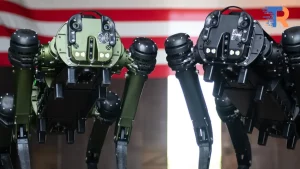
Unmanned Ground Vehicles (UGVs):
Ground-based robots are utilized for errands like bomb removal, observation in risky conditions, and supply transport. These robots can assist with limiting dangers to human work force. We also discussed 5 Japan Military Robots Read by click on link.
Remote-Controlled Weapon Systems:
Some military vehicles are equipped with remote-controlled weapon systems that allow operators to engage targets from a safer distance.These frameworks can upgrade a vehicle’s capability while decreasing the gamble to human administrators.
Logistics and Supply:
Autonomous vehicles and drones can be used for transporting supplies, equipment, and ammunition to and from the battlefield, reducing the need for human drivers in dangerous areas.
Search and Rescue:
Robots can be deployed in disaster-stricken areas or conflict zones to search for survivors, deliver medical supplies, and assess damage.
Communication and Reconnaissance:
Robots equipped with cameras, sensors, and communication equipment can provide soldiers with real-time information about their surroundings and potential threats.
Underwater and Maritime Operations:
Autonomous underwater vehicles (AUVs) can be used for underwater reconnaissance, mine detection, and other maritime operations.
Training and Simulation:
Military personnel often use robotic systems in training exercises to simulate real-world scenarios and improve their tactical skills.
It’s vital to take note of that the utilization of robots in the military likewise raises moral, lawful, and key contemplation. The degree to which robots are coordinated into military tasks relies upon different variables, including innovative capacities, cost-adequacy, the idea of the contention, and peaceful accords.
Moreover, conversations about the moral utilization of independent frameworks, responsibility for moves made by robots, and possible ramifications for non military personnel populaces are progressing.
For the most up-to-date information on the use of robots in the military, I recommend consulting recent sources and reports from relevant defense agencies and organizations.
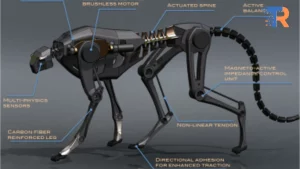
Are Robots the Future of Warfare?
Robots and independent frameworks are probably going to assume an undeniably huge part in store for fighting, yet it’s critical to perceive that they won’t totally supplant human association. The utilization of robots in fighting raises complex moral, lawful, key, and mechanical contemplation that shape their job and limits. Here are some key points to consider:
- Enhancing Military Capabilities: Robots can enhance military capabilities by performing tasks that are dangerous, repetitive, or require precision. They can be utilized for observation, reconnaissance, coordinated factors, knowledge social event, from there, the sky is the limit, permitting human officers to zero in on direction and vital preparation.
- Reducing Human Risk: One of the primary benefits of using robots in warfare is the potential to reduce the risk to human personnel. Robots can be sent in risky conditions, for example, regions debased by synthetic, natural, radiological, or dangerous dangers.
- Autonomous Weapons: There is ongoing debate and concern about the development of autonomous weapons, which can operate without direct human control. The utilization of such weapons brings up moral issues about their capacity to go with life-and-passing choices, the potential for abuse, and the responsibility for their activities.
- Human-Machine Teaming: The future of warfare future military robots may involve closer collaboration between humans and robots. Fighters could work close by automated frameworks, utilizing their exceptional abilities while holding human judgment, innovativeness, and moral contemplations.
- Ethical and Legal Concerns: The deployment of robots in warfare raises significant ethical and legal questions. These incorporate issues connected with proportionality, segregation, responsibility, and the potential for unseen side-effects.
- Public Perception and Acceptance: The level of public acceptance of robots in warfare will likely influence their future role. Far and wide worries about the moral ramifications of independent weapons could prompt constraints or prohibitions on particular sorts of mechanical frameworks.
- International Regulations: International agreements and treaties may shape the development and use of robots in warfare. Conversations among countries are progressing to lay out standards and guidelines for the utilization of independent weapons and other automated frameworks.
- Innovative Difficulties: While robots can carry benefits to the front line, they likewise face mechanical difficulties like unwavering quality, power, correspondence, and weakness to hacking or different types of digital assaults.
All in all, robots are to be sure a critical and developing part representing things to come of fighting, however they won’t totally supplant human troopers or chiefs. The job of robots in fighting will rely upon a complicated exchange of mechanical headway, vital contemplation, moral conversations, and peaceful accords. As innovation keeps on advancing, it is significant for society, policymakers, and the military to painstakingly explore these difficulties and settle on educated conclusions about the utilization regarding robots in struggle situations.
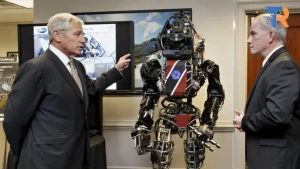
Will Robots Ever Replace Soldiers? -Future Military Robots
Whether or not future military robots will at any point totally supplant human warriors is a complex and discussed theme. While robots and autonomous systems are expected to play an increasing role in military operations, there are several factors that make the complete replacement of human soldiers unlikely in the foreseeable future:
- The nature of warfare often involves complex, dynamic, and unpredictable situations that require human judgment, intuition, and adaptability. Human soldiers possess cognitive abilities, empathy, and ethical considerations that are currently challenging to replicate in robots.
- The utilization of completely independent weapons that pursue life-and-demise choices without human intercession brings up huge moral and moral issues.
Machines having the position to take human lives without human responsibility is a subject of impressive discussion and concern. - Autonomous systems can make mistakes, misinterpret situations, or behave unpredictably.The potential for unseen side-effects and the trouble in programming robots to deal with each conceivable situation make total human substitution a mind boggling try.
- Widespread public acceptance of fully replacing soldiers with robots may be a significant hurdle. The utilization of robots in fighting can raise worries about the cheapening of human existence and the deficiency of the human component in direction.
-
While robots and computer based intelligence have made noteworthy headway, reproducing the full scope of human capacities, like imagination, the capacity to understand individuals on a deeper level, and nuanced correspondence, stays a huge test.
Military and political pioneers frequently pursue choices in light of a mix of military system, strategy, and cultural contemplations.
Human judgment and political discussion are significant parts of compromise that reach out past the capacities of robots. - Notwithstanding, it’s essential to take note of that robots and independent frameworks are now being utilized to upgrade military abilities in different ways.
They can help troopers with errands like observation, planned operations, and reconnaissance, advancing situational mindfulness and lessening chances. -
Future situations could include more noteworthy cooperation among people and robots, with people holding dynamic authority while robots offer help and expansion.
The turn of events and organization of independent weapons and mechanical frameworks likewise bring up significant moral and legitimate issues. Future military robots , many countries and international organizations are engaged in discussions to establish guidelines, norms, and regulations for the responsible use of these technologies in conflict scenarios. - In outline, while robots are supposed to play a rising part in military tasks, the total substitution of human fighters is impossible because of the mind boggling and complex nature of fighting and the moral contemplations included.
The eventual fate of fighting is bound to include a mix of human and mechanical capacities cooperating to accomplish military targets.
Which Country has the Most Military Robots?
The U.S. military has put vigorously in the turn of events and sending of different mechanical frameworks for a scope of purposes, including observation, reconnaissance, strategies, bomb removal, and that’s only the tip of the iceberg.
Several other countries also have notable future military robots programs, although the specific capabilities and deployments can vary. Some countries with significant military robot programs include:
- United States: The U.S. military has fostered a wide exhibit of mechanical frameworks, including automated elevated vehicles (UAVs), automated ground vehicles (UGVs), and independent submerged vehicles (AUVs). The U.S. has utilized drones broadly for reconnaissance, insight assembling, and designated strikes.
- Israel: Israel is known for its high level military innovation and has created different automated frameworks for observation, insight, and surveillance purposes.
The Israeli military has involved drones in battle and has additionally evolved ground-based robots for assignments like bomb removal. - China:: China has been quickly extending its tactical mechanical technology capacities, fostering a scope of automated frameworks, including drones, ground robots, and submerged vehicles.
China has put resources into both hostile and guarded automated advances. - Russia: Russia has been developing military robots for various purposes, including reconnaissance and demining. They have additionally displayed equipped ground robots and are known to investigate the utilization of independent frameworks in different military settings.
- South Korea: South Korea has developed advanced robotic systems for military and defense applications. They have zeroed in on creating ground robots for assignments like observation and reconnaissance along the peaceful area with North Korea.
- United Kingdom: The UK has developed unmanned systems for military use, including drones and ground-based robots. These frameworks have been utilized for observation and surveillance, as well concerning errands in unsafe conditions.
It’s important to note that the development and deployment of future military robots are subject to ongoing advancements, and the landscape may have evolved since my last update.
Additionally, the extent of military robot deployments can vary widely based on specific programs, budgets, and strategic priorities. For the most current and detailed information, I recommend consulting more recent sources and reports from defense agencies and organizations.
FAQs
What is the role of artificial intelligence (AI) in the development of future military robots?
AI plays significant role in future military robots, enabling them to process information, make decisions, and adapt to changing environments. Machine learning and AI algorithms enable robots to learn from experiences, improve their performance, and carry out tasks autonomously.
What are the ethical considerations surrounding the use of autonomous military
The use of autonomous military robots raises ethical concerns about accountability, proportionality, and the potential for unintended consequences. Questions about the future military robots machines to make life-and-death decisions, as well as the risk of civilian harm, are central to these discussions.
How do future military robots impact the roles and training of human soldiers?
Future military robots can impact the roles of human soldiers by providing support, assistance, and augmentation. Soldiers may need to learn how to collaborate effectively with robots, control them remotely, and understand their capabilities and limitations. Training and education may need to evolve to include robotic systems.
What international agreements and regulations are in place for future military robots?
International discussions are ongoing to establish norms and regulations for the use of future military robots, particularly autonomous weapons. Various countries are considering the ethical implications and legal frameworks surrounding the deployment of robotic systems in warfare to ensure compliance with international laws of armed conflict.




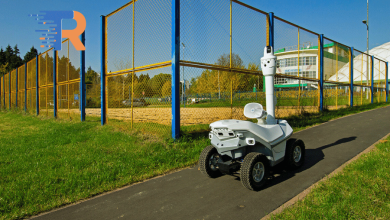
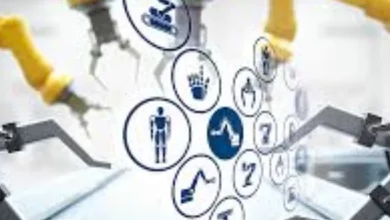
One Comment